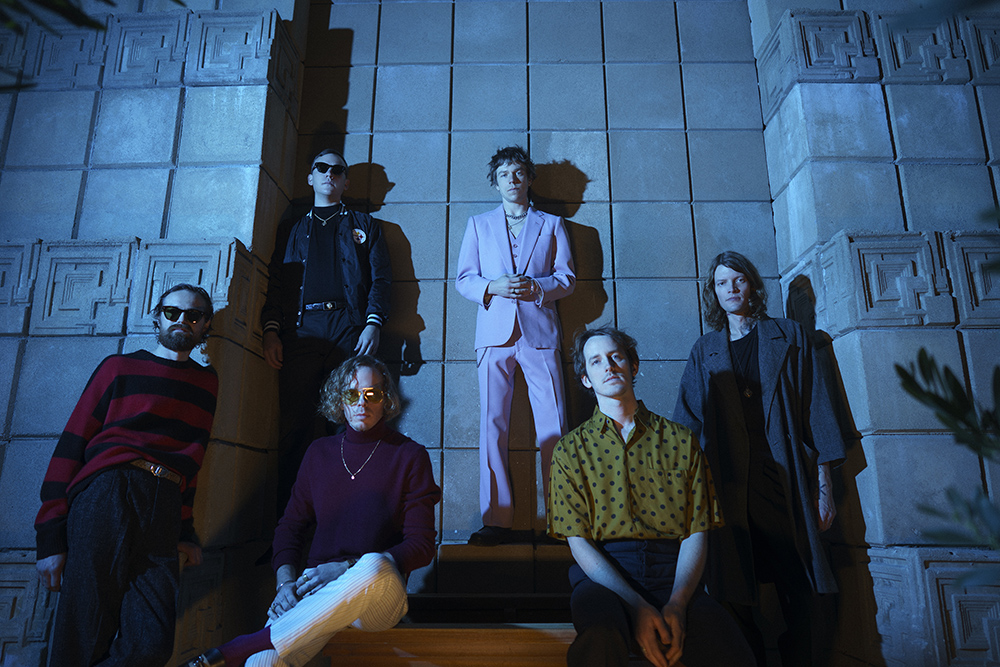Matt Shultz, frontman of Kentucky rockers Cage the Elephant, isn’t big on playing into narratives. This, despite the fact that the band’s latest album Social Cues, centres on two shopworn ones: a breakup (Shultz’s own) and the perils of fame. Still, sulky as the subject matter may be, the record doesn’t sound it — it’s all breezy vibes, funky rhythms, and glitzy, pan-cultural pop. No self-pity within earshot, and not quite what you’d expect from a band following up a raucous LP that won them the Best Rock Album Grammy.
Subverting expectations, really, seems to be Cage the Elephant’s M.O. Hell, when I speak to Shultz, he equates being called a rock band to “death.”And in spite of the many profiles detailing the chronic in-fighting between he and his sibling bandmate Brad, he insists that’s mostly fake news. Au contraire, he and his brother have in fact always had a pretty healthy relationship. Who knows what to believe anymore!
Ahead of Cage the Elephant’s double-header show in Toronto this weekend with Beck, we sat down with Shultz to chat about society’s heightened standards of behaviour, abandoning genre-based restrictions, and his band’s rather harmonious dynamic. Believe it or not.
So, Social Cues. What are you guys getting at with that title?
Well, it was part of a discussion within the band. We were talking a lot about a general state of hyper social paranoia; that we’re all kind of watching each other’s micro actions to base and judge our own actions and standards of behaviour. You know, that’s kind of manifesting itself in this very elusive form of legalism — unspoken legalism — and we were just acknowledging that that was quite dangerous. I think that’s how evil forces come in and flip entire civilizations and persuade them into doing horrific things and so we just thought that that was pretty interesting. And then, we thought about how that plays into your life as an individual, as a person, and informs some of your decision making in your thoughts and your opinions. That’s where the start of that concept came from.
Is it a reference to outrage culture? People getting offended too easily?
I mean, I think that’s one of the ways that it manifests itself, right? And I’m not making this statement on how easy people should be offended or the opposite. I think, for myself, the thing that we were looking at more is that depression is at an all-time high and the suicide rate is up, and anxiety is up.
And why do you think that is?
Well, I think there are certain things that are happening that we probably all, deep within ourselves, have a sense of but can’t quite put our finger on. And I think that being under a certain standard and finding it quite difficult to even pinpoint what that standard is, and then definitely not being able to live up to it, is quite stressful. It’s all those things. It is very, very heavy.

Would you say you guys have high standards for yourselves as a band?
Umm…no. [Laughs.] No, I’m joking. I hate how serious I always sound in these interviews, but I suppose I am pretty serious to a degree. I’m probably more serious than I acknowledge. But, I think we definitely have a standard that we put ourselves in subject to and other standards, which are dictated by society, but society is dictated by the individual, so it’s hard to say! I don’t know. [Laughs.]
Well, other than that, I read that you were personally going through a rough time when making this album.
Yeah. Yes, myself for sure. And Brad as well and everybody in the group had certain things going on. We all did. It’s hard for me to just take all the focus. But yeah, I had a family member who I grew up with pass away. He wasn’t just my cousin, he was my best friend. And then I had a couple friends who took their own lives and I had a relationship that kind of didn’t work out. So, all those things were happening at the same time. It was just one of those turbulent times in life that you can’t predict and you have to deal with.
I understand you were going through a divorce. But what’s strange is, just from listening to the music without paying attention to the lyrics, it sounds pretty upbeat! It sounds not that depressing to me.
I mean, it’s so funny. I think that if we only leaned into one shade of life it would be pretty melodramatic. [Laughs.] But, you know, thankfully life also comes in many different hues. So, I find the record quite helpful.
Is it tough writing lyrics about a breakup knowing you’ll have to revisit them again and again when you go on tour, and have to address them in interviews?
I never think about that whenever we’re writing. And I don’t think that the process in that sense is quite difficult, as much as it is going through a difficult time. The only song that was really, really tough in the studio, I think, was “Goodbye.” Just because that was kind of like a moment of closure, so I guess in all actuality it was more about the moment. Maybe that was just a full realization of it, but yeah. It was a tough moment.
Yeah, that’s a sad one.
But I also hear a lot of hope in that song, to be honest, which is wild.
Was the recording process somber, given that you and the band were going through rough times?
What do they say? You never realize how tough things are when you’re having a poor Christmas until you look back years later. [Laughs.] I mean, it’s all about your pain index. It’s all according to what you’re used to. But I think that the dark side of things are more easily embellished. They’re sexier — there’s no doubt that it’s a juicier story. But there are also good times and moments of joy. With that being said, I’m probably doing a fair bit of dodging, but yeah, there were some painful moments for sure.
Congrats on winning the Grammy for Best Rock Album, by the way. What would you say has changed for you guys since winning it?
I mean, most of it is, like, practical things. Having the ability to do a little more within the workspace. But creatively, I don’t think these kinds of things have driven us. If there is anything, it’s probably small notes of trying to keep the focus where it originated.
Coming off that album going into this one, was there a different direction you guys wanted to go in? Were you wary of repeating yourselves?
You know, I think that you’re undoubtedly going to repeat characteristics. There are going to be some characteristics that you can’t shed. But for us, we’re always looking for something new in music in general, as listeners, to become obsessed with again and excited about. And so, you’re evolving as a listener. I think the way that you evolve as a listener ultimately shapes the way you create music. But also, music has been evolving so rapidly and has been for years and years. I think our ears have evolved way past where society has held its expectation. For whatever reason, we’re afraid of things that we’re not familiar with, and so things that we fall in love with — for instance, a group of musicians that are making music — there’s a particular way we like to see those individuals as a collective make music, because we’re familiar with it. So, you know, if there was any kind of shedding, I’d say it’s shedding that baggage.
You know, we’ve been pushing more and more to play the studio — the studio’s become, I think, a really important instrument. Always has been. But it seems to be more and more important, so I’m especially interested in emerging software. You can do things that seemingly have never been able to be done with recording, and it’s a really exciting time for music. I think a lot of that had a huge impact.
A lot of people say it’s hard to be a rock band these days, because rock isn’t as popular as electronic music or rap. They say it’s very limiting. What do you say to that?
Don’t be a rock band! I don’t know. I don’t listen to music that way. You know what I mean? I think even the groups that were born out of the period that you might call rock & roll, I don’t think even called themselves rock & roll bands. Although, actually I take back because I did hear Paul McCartney say, “I think we were a good little rock band.” [Laughs.] But at the same time, I’ve definitely heard those guys refer to themselves as a musical group, and I think there’s a lot of power in that. You allow the song and the character and the personality of the song or album at large to dictate what is needed in the studio or instrumentally or as far as arrangement is concerned. And you don’t get too caught up in a genre-based title. I mean, that’s like death to me. Why would you let a word dictate something like music? It’s certainly like segregation, which is really weird. So that’s something I’m really super encouraged about in music today, being part of the playlist generation. We’re not as segregated we used to be, certainly not by race or gender, but ford god’s sake, one place where there should not be segregation is in music! Music has no eyes. I mean, the eyes of music are the heart. So, thank God we’re pulling away from that.
Absolutely. Speaking of which, the song “Night Running” on your new album is kind of a reggae song. I heard there was some conflict within the band about the song’s direction. You didn’t all agree on it?
Oh no, there wasn’t a disagreement. I was just having trouble finding the direction for the verse. We had a really great chorus happening and the song was working except for the verse. And Brad just had an instinct that Beck would know. [Laughs.] So, we met him a couple times and obviously knew of his great talent. We had some lovely times hanging with him. So, we sent the track to him and within like two days he sent back several options. And his first swing was incredible, which I think is a testimony to the caliber of his talent. Yeah, it was really cool. It’s funny, again, it’s like that sexy story, right? The confrontation. But I think confrontation is necessary in any field of work, especially when you’re creating something, because no one has that infallible universal perspective. [Laughs.] So, we have to discuss these things. Sometimes the communication is good and ends well. And sometimes the communication is bad and it takes time. So, I think in that instance, honestly, it was pretty good communication. And we’re communicating better. But I think in our younger days, we weren’t very good communicators and we fought a lot, and so it’s part of the narrative people love. It gets played up.
It really does. Conflicts are sexy! Especially in a band of siblings.
Yeah, right. [Laughs.] I mean, I genuinely feel bad for siblings who have a lot of trouble. Me and Brad, you know, we have our fair share, but I think that we’re pretty solid.
Yeah? You’re in a good place now?
Yeah. And I think, generally speaking, we always have been. It’s a funny thing.
You wouldn’t sense that from reading articles about your band over the years.
Well, I mean, lift one sentence and all of a sudden, it’s an entire story. [Laughs.]
Yeah, it’s a hook! Well, enough drama then. Do you have any fun stories — anything fun that happened recently in the studio or on the road?
Oh yeah, I have a really good one. Recently I was in Miami and got to spend some time with Iggy Pop. I’ve been studying this forum of Japanese dance for about six months in New York called Butoh. One of my friends showed me it and suggested that I look into it. I immediately felt connected to it. I was like, “Man, this just seems like something David Bowie would do if he was a young man.” [Laughs.] It’s an extremely colourful practice. And so, I’m starting to do this intensively and feeling really good about it. Flash forward to hanging out with Iggy and I was talking to him and was like, “Yeah, so, I’m studying this dance form called Butoh.” And he goes, “Ahhh, you’re a cultured young man. David and I, when we were younger, went to some Butoh performances.” I was like, “I knew it!” [Laughs.] I just thought that was pretty sick.
So random!
Oh man, he’s an extremely intelligent person and very, very in the know of the arts.
Has learning Butoh impacted your music or stage moves at all?
Yeah, for sure. I mean, it’s impacted the creative voice in general. They call it impulse-based work. So, it’s all impulse. You don’t want to go into a particular situation having made up your mind about what’s going to happen or how you’re going to act. You know, you don’t give it to whatever force or restraint or whatever it is that’s at play. You just allow yourself to react rather than act. And I think it’s incredible, the honesty it will bring out of you. So, it’s been awesome. I’m loving it.



